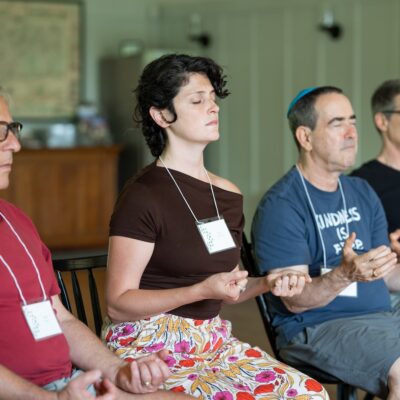PIVOT PLAN
Lacking funding, Ta’amod to shutter as nonprofit in March, will spin off into a smaller for-profit agency
The workplace improvement nonprofit saw a rush of funding in the wake of the #MeToo movement, but this dried up over time, leaving the group with no other path forward

Getty Images
Illustrative.
In the wake of the #MeToo movement, there was a rush of funding to launch Ta’amod, a nonprofit that looked to address gender inequality and harassment and generally improve workplace culture. But six years later, the group, which means “stand up” in Hebrew, is being forced to shutter as funding has dried up and spin off into a smaller for-profit organization.
“Over and over and over again, we were being told by funders, ‘This work matters. We need it, and nobody else is really doing what you’re doing, but we’re not going to fund it. At least not now,’” Nicole Nevarez, Ta’amod’s CEO, told eJewishPhilanthropy.
The initial rush of funding that helped launch the organization eventually dried up, and the Jewish community’s shifting priorities in light of the war in Israel and the rise of antisemitism globally effectively ended the group’s chances of rebounding. “Oct. 7 stopped the conversation altogether,” Nevarez said.
The nonprofit will shutter on March 31, 2025, with some of the staff pivoting to operate under a new for-profit model as a service provider.
“The Jewish community has traditionally infused a lot of money into those hot-flash moments and not stuck around for funding the long-term work,” Nevarez said.
The closing of Ta’amod as a nonprofit comes amid a general shift away from many of the diversity, equity and inclusion efforts that took root in workplaces across the United States in the wake of the #MeToo movement and the George Floyd protests in 2020.
Nevarez said her organization focused on effecting long-term changes at organizations to allow employees to feel safe and do their best work, rather than short-term efforts to address illegal behavior.
“We have a lot of toxic workplace issues in the Jewish community where people are deeply harmed without anything raising remotely to the level of unlawful,” she said.
The organization’s goals were based around kavod habriyot, literally “respect for the creations,” a Jewish concept that everyone is valued and deserves to be treated with dignity, Debbie Nehmad, Ta’amod’s director of programs and partnerships, told eJP.
When employees don’t feel safe, heard or appreciated, it costs nonprofits because they waste money on training and retaining employees due to frequent turnover, Nehmad said. In 2022, the average turnover for nonprofit organizations was approximately 19%, compared to the average across industries of 12%.
Since launching, Ta’amod has worked with the Central Conference of American Rabbis, the Association of Reform Jewish Educators, the Foundation for Jewish Camp and other national organizations.
The JCC Association of North America began working with Ta’amod before the COVID-19-pandemic because “employee engagement was low and people weren’t feeling confident in the way that their supervisors were caring about them,” Joy Brand-Richardson, vice president of training and professional development for the JCC Association of North America, told eJP.
Since then, the JCCs that participated have seen that employees “are more connected, more engaged or passionate about the work that they’re doing, because they feel cared for,” Brand-Richardson said.
The JCC Association plans to continue to work with Ta’amod staff after they go for-profit. “Just because they’re sunsetting Ta’amod doesn’t mean that the work can stop or will stop,” Brand-Richardson said
Post-Oct. 7, this work is more important than ever, Rachel Cort, executive director of Mishkan Chicago, who began working with Ta’amod in 2019, told eJP. “This past year in particular has been very challenging for Jewish organizations. Ta’amod has been a great thought partner for helping us navigate situations where feelings and emotions are running high and helped us remember to keep the experience of staff a priority,” Cort said.
Although Ta’amod did fire their communications and operations manager and will no longer hire outside trainers, the organization’s three core employees will remain on staff when it goes for-profit. The team is still taking work through Ta’amod provided it can be completed before the end of March, and they are lining up work for the new for-profit organization, which they are brainstorming names for.
Ta’amod’s leaders said they recognize that going for-profit may make it difficult for smaller nonprofits to afford, but they are looking for ways to make their services accessible by offering a sliding scale and helping clients seek donors to subsidize their work.
“To whatever degree possible, it is our full intention to try to work with [agencies who need support], while honoring our own internal equity practices of what we know we deserve to be paid and what the work really costs in terms of the time and energy that we dedicate,” Nehmad said.
Everyone at Ta’amod feels “a sense of frustration that this is what it’s come to,” Nehmad said, but there’s also a sense of freedom. They no longer have to market themselves as simply “harassment prevention.” Instead they are being “explicit in our goals of creating healthy workplace culture and systemic justice work.”

 Add EJP on Google
Add EJP on Google












